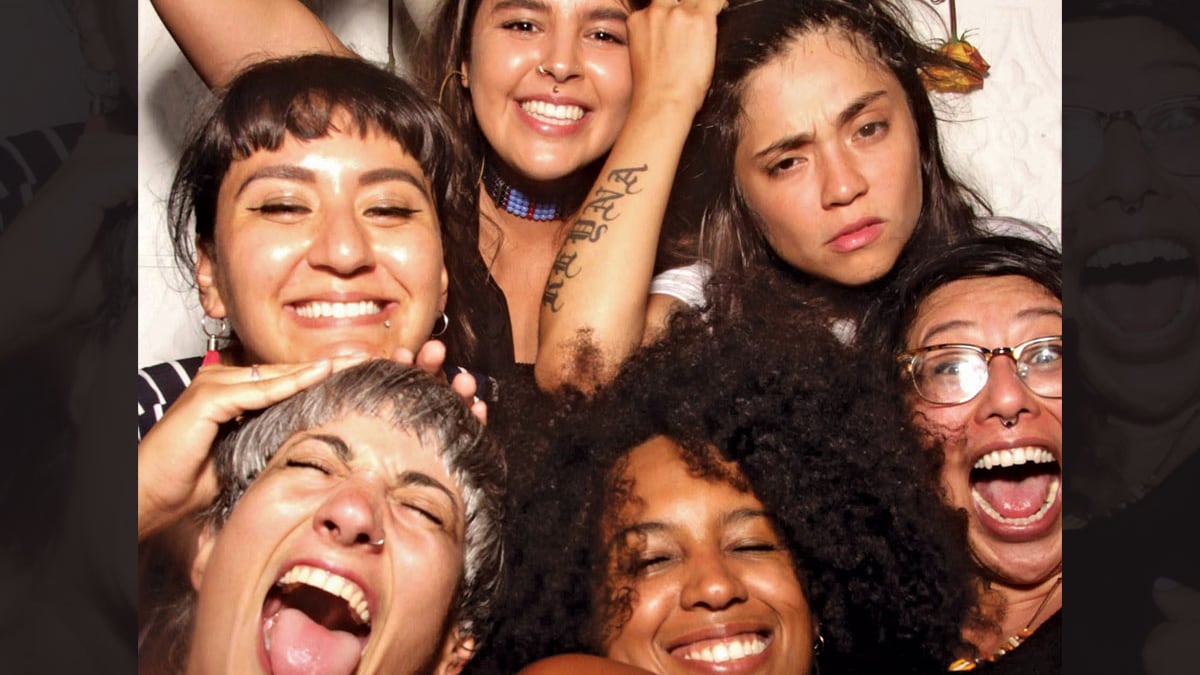To Luz Elena Mendoza, playing rancheras music in her DJ sets is almost an act of solidarity.
"It's kinda like putting a message in a bottle and throwing it out and seeing if my people would come," says Mendoza, who DJs under the name Lucha and is best known as the frontwoman of Y La Bamba. "And then they find it and are like, 'Oh my God, that song!'"
So last year, Mendoza—along with She Shreds magazine founder Fabi Reyna and writer Emilly Prado—founded Noche Libre DJ collective. The project started as a mutual love for the music the trio grew up listening to—songs played at the community gatherings, family dinners and birthday parties of their childhoods, and that were noticeably absent from Portland DJ nights. Along with music that fit under the banner of rancheras, the collective's monthly parties include other strands of Latin and Latin-influenced music like cumbia and hip-hop, too.
Noche Libre had its official launch party last month, but the collective has been playing together unofficially for about a year. "We'd added quite a few new members, so it was just an opportunity to be like, 'All right, we're here," says Prado, who DJs as Mami Miami.

Before Noche Libre, Mendoza says she often felt a sense of trepidation when she played rancheras during her DJ sets.
"I would play a Valentine's or Beech Street Parlor or something and quietly play rancheras and be like, 'This is a safe place—maybe people will listen to it,'" she says.
But after she co-found Noche Libre, it became clear that Mendoza wasn't alone. The collective has now grown to include Diana Suarez (DJ Tita), Yuriko Zubia (DJ Xolotl) and Marina Mena (DJ Bombón). Noche Libre spins at Dig A Pony every third Thursday, but they aren't just throwing a dance party, they're building the Latinx community they've sorely missed.
"Community is a huge part because in our culture, we always get together. Food, music, even the gossip, the good and the bad, but we all come together," Mendoza says. "I think that that is just to show it's not just like a momentum for a collective, but it's momentum to show other people, our wide community, the many faces and many complexities of what it is to be a Mexican American."
Mena, who DJs professionally outside the collective, joined because she had long been looking for a family away from her family. Suarez, who DJs and engineers for XRAY.FM, had seen similar collectives pop up in Los Angeles and the Bay Area, and she eventually connected with Noche Libre at a She Shreds event.
"Something I've been experiencing through DJing in town is the recontextualizing of these songs from our youth," Suarez says. "Generally, the content of these old boleros and rancheras is a little bit misogynistic. We grew up listening to that, and while we might not necessarily agree with the sentiment, the songs bring up these feelings, and I'm sure that there are people, especially in the queer community, who struggled with who they are and how their family felt about them."
Prior to joining Libre Noche, Zubia wasn't even a DJ. She was, however, increasingly dissatisfied with the scene in Portland. She heard about Noche Libre through Prado and Jené Etheridge (DJ Black Daria), who encouraged her to join the collective, despite her lack of experience. "Jené was like, 'You should just come to a meeting—we'll teach you,'" Zubia recalls. "And so I went."
As the collective grew, it began to feel bigger than just a group of DJs playing songs from their childhood. Noche Libre didn't just act as a substitute for the community the members craved, it became that community.
"This is a space that's run by Latinx femmes, and there's a lot of queer people who come to our parties, and that's very much intentional," Prado says. "This is a space for people to be able to be comfortable and not have to be afraid that someone's going to come up on you and be creepy."
In that way, Noche Libre isn't just about nostalgia—it's about shifting the power of rancheras to a younger audience.
"It's been really cool to play songs that people would have to listen to with their really mean tios and really mean tias," Suarez says, "and just be with people they know really care about them and just feel safe."
SEE IT: Noche Libre is at Dig A Pony, 736 SE Grand Ave.,
digaponyportland.com, on Thursday, Sept. 20. 9 pm. Free. 21+.

